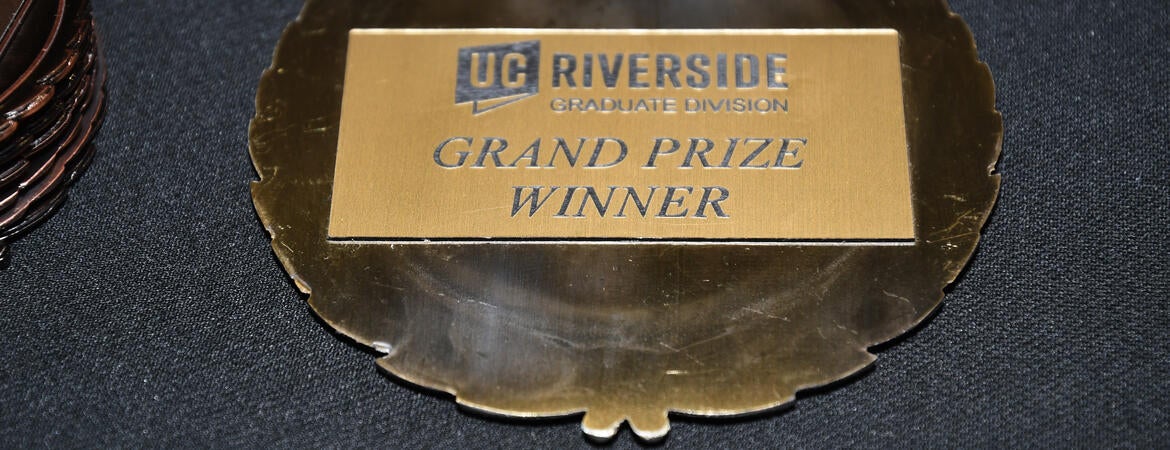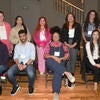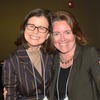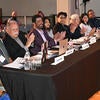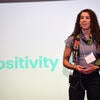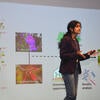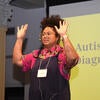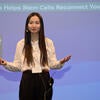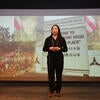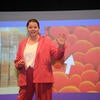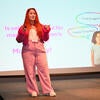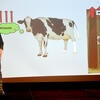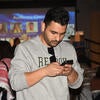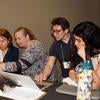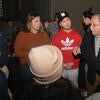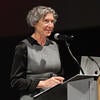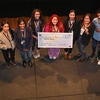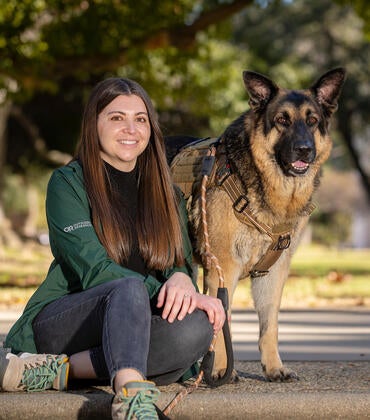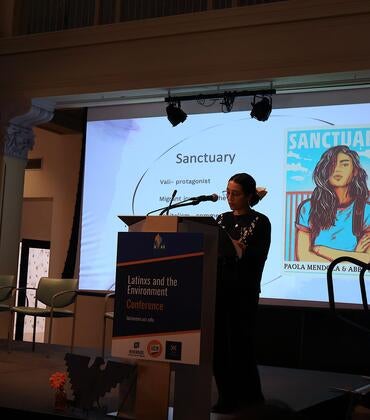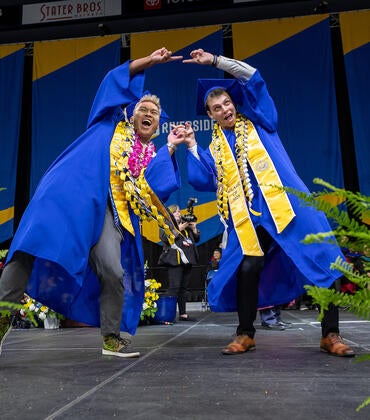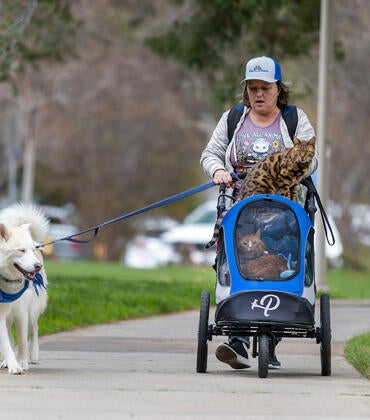Nine Highlander Ph.D. candidates presented their research dissertations for a chance at $5,000 at the Barbara and Art Culver Center of the Arts in downtown Riverside on April 8 at the 10th annual UC Riverside Grad Slam Finals.
Grad Slam is a University of California-wide speaking competition in which graduate students describe their research in three minutes to a general audience. The UCR competition started with 35 participants who were whittled down to 16 semi-finalists. The nine finalists were announced in March.
“For our students, this is a wonderful professional development opportunity. They are honing their presentation and communication skills before a general audience,” said UCR Provost Elizabeth Watkins. “This is also a fun way for the rest of us to find out about the exciting research and creative projects our graduate students are pursuing here at UCR.”
The finalists sat off to the side of the waist-high stage surrounded by Grad Division’s event organizers, eight judges, and a hundred or so onlookers, yet seemed to be in a whole other universe. A couple seemed unfazed, chatting with friends and family who came to support their live, on-stage, three-minute research pitch. But most were sitting still, eyes scanning the imaginary outline they had saved in their brain, silently mouthing their pitch, sitting just inches away from a giant $5,000 novelty check, brought in solely for photo ops and inspiration.
Some pitches were high-energy, and some were more chill. Some presenters were quick and comical, some matched the heaviness of their research with stretched-out syllables and serious words. The slides each presenter clicked through varied, as well. Suicide statistics. The tree of life. Brain scans. The words, “autism spectrum disorder,” in giant letters. A wheelchair-bound person transitioning into a standing person. Two dead Latina women dressed in army fatigues. Yeast having sex. A cartoon brain full of motivating phrases. A cow standing next to a poop lagoon.
When the pitches were done, the last presenter’s slides were replaced with a QR code, and the audience was asked to vote for their favorite presenter. Then everyone was released for a 30-minute break while the judges’ scores were tallied. They were scored on how well they engaged the audience, how clearly they communicated key concepts, and how effectively they focused and presented their ideas.
Watkins announced the winners:
- Audience Choice: Lu Jin (bioengineering)
- 3rd Place: Alyssa Valdez (environmental sciences)
- 2nd Place: Eva Ottum (chemical and environmental engineering)
The grand prize winner was announced last — Shannon Brady (psychology) and her research, “Thinking out Loud: Is Self-talk a Secret to Success?” She was handed the giant check and reminded that she will have to do this all over again in a few weeks when she pitches in San Fransisco at the UCOP-hosted Grad Slam Finale. The finale brings together winners from the other nine UC campuses for one epic battle for $7,000.
Tune into YouTube on May 3 to watch the 2024 UC Grad Slam. To follow social media coverage, check out #ucrgradslam and #gradslam2024.
Learn more about UCR’s nine Grad Slam finalists and their research:
Alyssa Valdez | Environmental Science | Class of 2026
Why Number 2 Should Be Your Number 1: Estimating Methane Emissions from Dairy Manure Management
“I want the public to learn a bit more about some methane management strategies that California is utilizing- and above all else I love poop!”
Amin Ghaffari | Bioengineering | Class of 2025
Unlocking Minds: Brain-Based Fingerprinting for Early Alzheimer's Diagnosis
“Each year there are lots of people diagnosed with Alzheimer's disease, most of them at a stage that it is too late for any intervention. Based on this, a method that can help us recognize people who might be prone to Alzheimer's at earlier ages could be very helpful, and our algorithm is exactly looking for that.”
Eva Ottum | Chemical and Environmental Engineering | Class of 2026
Yeast Sex
“I've always been inspired by yeast because even though they are small, they are able to accomplish great feats. How can such tiny organisms achieve so much? By nudging them in a certain direction, we can harness this power for sustainable goals.”
Ísis Higino Silva | Anthropology | Class of 2025/26
Autism Spectrum Disorder Diagnosis When Considering Race, Gender, and Sexuality
“As a late-diagnosed autistic who is Black, Latina, and queer, I experienced first-hand medical neglect and was not diagnosed until I was 28 years old. It became a hyperfocus of mine to study autism, and I realized how behind research is in terms of addressing social issues and how it might affect diagnosis.”
Lu Jin | Bioengineering | Class of 2025
Silk Helps Stem Cells Reconnect Your Nerves
“I am thrilled to see that finally I have reached one milestone in my research. And I can't wait to share to see if the public are also interested in witnessing the potential of a natural biomaterial coming from silk cocoons in regulating stem cell behaviors, and potentially neurological diseases' treatment in future. And I want to bring attention to the public that stem cell therapy is not fraud and so many researchers are working hard to discover and enhance its capacity.”
Nathaly Ortiz | Ethnic Studies | Class of 2026
Cerca del río la Enterró: Hauntings and Ghosts of Fort Hood
“I was deeply impacted by the deaths of U.S. Army soldiers Vanessa Guillén and Ana Fernanda Basaldúa Ruíz, and the countless other women whose lives ended too early. I am inspired by the families and communities who have mobilized to seek justice in the wake of these deaths across the U.S. and México. The rich social and political texts that have been produced by the families and communities in the wake of these deaths should be understood and valued as the basis for radical and meaningful change that does not rely upon military solutions.”
Shannon Brady | Developmental Psychology | Class of 2025
Thinking out Loud: Is Self-talk a Secret to Success?
“I always joke that most research has at least a little bit of ME-search involved, and this project is no exception. During the COVID-19 pandemic, I realized just how much I was talking out loud to myself and it made me wonder ‘Why am I doing this? Do other people do this??’ Turns out the answer to the latter question is YES, people use self-talk very often and it's quite normal. Children naturally begin using it early on in life and it helps scaffold their thoughts, actions, and behavior. That makes sense, because most often when I talk to myself it's when I'm trying to make a plan for my later actions, when I'm trying to anticipate an interaction, or when I'm trying to coach myself through something difficult and I don't have access to other people for social support. Though most of the self-talk literature is about children (fortunately, my field of study), there has been less empirical investigation of why/how self-talk may become internalized around school age and whether/how self-talk might support emotional processes. So, my dissertation aims to begin disentangling these open questions!”
S. Gangothri | Evolution, Ecology and Organismal Biology | Class of 2028
A Window to Hybrid Speciation: The Reproductive Barriers in the Native Penstemon Species of Southern California
“Understanding the processes that shape the species diversity has always been intriguing to me, with hybridization being one of them. With my research, I want to study how hybridization directly contributes to the formation of new plant species, using Penstemons as my model organism.”
Zariah Tolman | Developmental Psychology | Class of 2024
The Positivity Outward Mentoring App: Empowering Youth to be Successful and Well
“Growing up low-income in a Wyoming town of 50 people, I didn't have access to mentors, so I lacked confidence, felt alone, and struggled to know how to move forward. I founded the nonprofit Positivity Outward and created the Positivity Outward Mentoring App to empower marginalized youth like me with mentors who guide progress, success, and wellness. In my Grad Slam presentation, I share the results from our year-long pilot study with just over 200 students and almost 100 mentors.”
